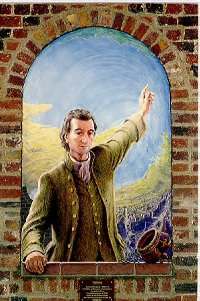See Dissecting Deism Past and Present
Thomas Jefferson's Letter to Peter Carr
Jefferson's letter to Peter Carr Paris, August 19, 1785
DEAR PETER, -- I received, by Mr. Mazzei, your letter of April the 20th. I am much mortified to hear that you have lost so much time; and that when you arrived in Williamsburg, you were not at all advanced from what you were when you left Monticello. Time now begins to be precious to you. Every day you lose, will retard a day your entrance on that public stage whereon you may begin to be useful to yourself.
However, the way to repair the loss is to improve the future time. I trust, that with your dispositions, even the acquisition of science is a pleasing employment. I can assure you, that the possession of it is, what (next to an honest heart) will above all things render you dear to your friends, and give you fame and promotion in your own country.
When your mind shall be well improved with science, nothing will be necessary to place you in the highest points of view, but to pursue the interests of your country, the interests of your friends, and your own interests also, with the purest integrity, the most chaste honor. The defect of these virtues can never be made up by all the other acquirements of body and mind. Make these then your first object. Give up money, give up fame, give up science, give the earth itself and all it contains, rather than do an immoral act.
And never suppose, that in any possible situation, or under any circumstances, it is best for you to do a dishonorable thing, however slightly so it may appear to you. Whenever you are to do a thing, though it can never be known but to yourself, ask yourself how you would act were all the world looking at you, and act accordingly. Encourage all your virtuous dispositions, and exercise them whenever an opportunity arises; being assured that they will gain strength by exercise, as a limb of the body does, and that exercise will make them habitual.
From the practice of the purest virtue, you may be assured you will derive the most sublime comforts in every moment of life, and in the moment of death. If ever you find yourself environed with difficulties and perplexing circumstances, out of which you are at a loss how to extricate yourself, do what is right, and be assured that will extricate you the best out of the worst situations.
Though you cannot see, when you take one step, what will be the next, yet follow truth, justice, and plain dealing, and never fear their leading you out of the labyrinth, in the easiest manner possible. The knot which you thought a Gordian one, will untie itself before you.
Nothing is so mistaken as the supposition, that a person is to extricate himself from a difficulty, by intrigue, by chicanery, by dissimulation, by trimming, by an untruth, by an injustice. This increases the difficulties ten fold; and those who pursue these methods, get themselves so involved at length, that they can turn no way but their infamy becomes more exposed. It is of great importance to set a resolution, not to be shaken, never to tell an untruth.
There is no vice so mean, so pitiful, so contemptible; and he who permits himself to tell a lie once, finds it much easier to do it a second and third time, till at length it becomes habitual; he tells lies without attending to it, and truths without the world's believing him. This falsehood of the tongue leads to that of the heart, and in time depraves all its good dispositions.
An honest heart being the first blessing, a knowing head is the second. It is time for you now to begin to be choice in your reading; to begin to pursue a regular course in it; and not to suffer yourself to be turned to the right or left by reading any thing out of that course.
I have long ago digested a plan for you, suited to the circumstances in which you will be placed. This I will detail to you, from time to time, as you advance. For the present, I advise you to begin a course of ancient history, reading every thing in the original and not in translations. First read Goldsmith's history of Greece.
This will give you a digested view of that field. Then take up ancient history in the detail, reading the following books, in the following order: Herodotus, Thucydides, Xenophontis Hellenica, Xenophontis Anabasis, Arrian, Quintus Curtius, Diodorus Siculus, Justin.
This shall form the first stage of your historical reading, and is all I need mention to you now. The next, will be of Roman history (*). From that, we will come down to modern history. In Greek and Latin poetry, you have read or will read at school, Virgil, Terence, Horace, Anacreon, Theocritus, Homer, Euripides, Sophocles. Read also Milton's Paradise Lost, Shakespeare, Ossian, Pope's and Swift's works, in order to form your style in your own language. In morality, read Epictetus, Xenophontis Memorabilia, Plato's Socratic dialogues, Cicero's philosophies, Antoninus, and Seneca.
In order to assure a certain progress in this reading, consider what hours you have free from the school and the exercises of the school. Give about two of them, every day, to exercise; for health must not be sacrificed to learning. A strong body makes the mind strong. As to the species of exercise, I advise the gun. While this gives a moderate exercise to the body, it gives boldness, enterprise, and independence to the mind. Games played with the ball, and others of that nature, are too violent for the body, and stamp no character on the mind. Let your gun therefore be the constant companion of your walks.
Never think of taking a book with you. The object of walking is to relax the mind. You should therefore not permit yourself even to think while you walk; but divert your attention by the objects surrounding you. Walking is the best possible exercise. Habituate yourself to walk very far. The Europeans value themselves on having subdued the horse to the uses of man; but I doubt whether we have not lost more than we have gained, by the use of this animal.
No one has occasioned so much, the degeneracy of the human body. An Indian goes on foot nearly as far in a day, for a long journey, as an enfeebled white does on his horse; and he will tire the best horses. There is no habit you will value so much as that of walking far without fatigue. I would advise you to take your exercise in the afternoon: not because it is the best time for exercise, for certainly it is not; but because it is the best time to spare from your studies; and habit will soon reconcile it to health, and render it nearly as useful as if you gave to that the more precious hours of the day.
A little walk of half an hour, in the morning, when you first rise, is advisable also. It shakes off sleep, and produces other good effects in the animal economy. Rise at a fixed and an early hour, and go to bed at a fixed and early hour also. Sitting up late at night is injurious to the health, and not useful to the mind.
Having ascribed proper hours to exercise, divide what remain, (I mean of your vacant hours) into three portions. Give the principal to History, the other two, which should be shorter, to Philosophy and Poetry. Write to me once every month or two, and let me know the progress you make. Tell me in what manner you employ every hour in the day. The plan I have proposed for you is adapted to your present situation only. When that is changed, I shall propose a corresponding change of plan.
I have ordered the following books to be sent to you from London, to the care of Mr. Madison. Herodotus, Thucydides, Xenophon's Hellenics, Anabasis and Memorabilia, Cicero's works, Baretti's Spanish and English Dictionary, Martin's Philosophical Grammar, and Martin's Philosophia Britannica.
I will send you the following from hence. Bezout's Mathematics, De la Lande's Astronomy, Muschenbrock's Physics, Quintus Curtius, Justin, a Spanish Grammar, and some Spanish books. You will observe that Martin, Bezout, De la Lande, and Muschenbrock are not in the preceding plan. They are not to be opened till you go to the University.
You are now, I expect, learning French. You must push this; because the books which will be put into your hands when you advance into Mathematics, Natural philosophy, Natural history, will be mostly French, these sciences being better treated by the French than the English writers. Our future connection with Spain renders that the most necessary of the modern languages, after the French.
When you become a public man, you may have occasion for it, and the circumstance of your possessing that language, may give you a preference over other candidates. I have nothing further to add for the present, but husband well your time, cherish your instructors, strive to make every body your friend; and be assured that nothing will be so pleasing, as your success, to, Dear Peter,
Your's affectionately,
(*) Livy, Sullust, Caesar, Cicero's epistles, Suetonius, Tacitus, Gibbon.
From: The Avalon Project at Yale Law School The Letters of Thomas Jefferson
Copyright 1998 The Avalon Project? I don't see how they can copyright an original work written centuries ago. But I'll give them credit for presenting it.
- Islam Versus Deism
- Left vs Right, Montesquieu, Corporatism
- Eastern Roman Empire and Islam
- Philosophies of Islam, Greece, and the West by Turgut Ozal
- Example of Islam and science.
- Maimonides Versus Aristotle and the Jews of Spain, Thirteen Rules
- Handbook on the History of Modern Science
- Pelagius and why he was right
- Islam Versus Judaism and Christianity
- Islam to Deism: Why I became a Deist
Web site Copyright Lewis Loflin, All rights reserved.
If using this material on another site, please provide a link back to my site.

